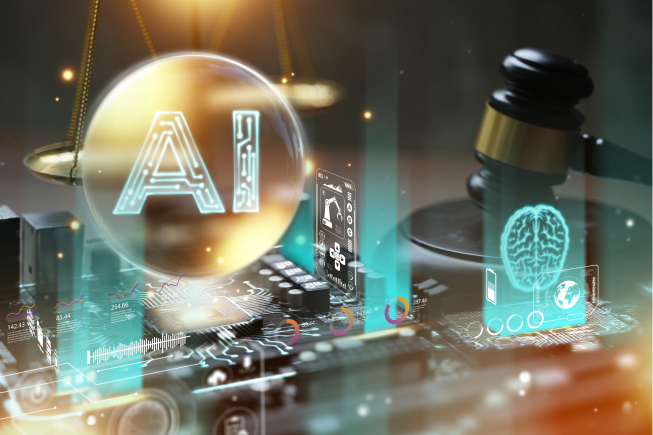Keeping you ahead of the curve with our AI Strategy
Impact of AI in State and Local Government

Abstract:
Artificial intelligence (AI) is transforming the state and local government sector by improving operational efficiency, enhancing citizen services, and reducing costs. This paper explores the impact of AI on various aspects of the state and local government sector, including citizen engagement, public safety, transportation, and administrative tasks. We discuss the potential benefits, challenges, and ethical considerations associated with AI adoption in the state and local government sector and highlight the importance of a responsible and collaborative approach to ensure the equitable use of AI. We also provide impactful statistics and discuss additional applications of AI in the state and local government sector.
Introduction:
The state and local government sector is undergoing significant transformation, driven by rapid advancements in artificial intelligence (AI) technologies. Governments are increasingly leveraging AI to improve operational efficiency, enhance citizen services, and reduce costs. According to a report by Deloitte, AI is expected to generate $41.1 billion in cost savings for state and local governments by 2025. In this paper, we delve into the impact of AI on various aspects of the state and local government sector, discussing the potential benefits, challenges, and ethical considerations.
Citizen Engagement:
AI can help improve citizen engagement by providing personalized and efficient services to citizens. AI-powered chatbots can assist citizens in answering questions, providing feedback, and offering recommendations, leading to improved citizen satisfaction. Additionally, AI can assist in identifying patterns and trends in citizen interactions, allowing for more effective policy-making and service delivery. According to a report by McKinsey, AI-powered citizen engagement solutions can reduce citizen service costs by up to 70%.
Public Safety:
AI can help improve public safety by analyzing vast amounts of data on crime, emergencies, and natural disasters, allowing for more effective emergency response and prevention. AI-powered tools can assist in predicting crime hotspots, identifying potential emergencies, and analyzing social media for real-time situational awareness. Additionally, AI can assist in identifying patterns and trends in public safety, allowing for more effective policy-making and resource allocation. According to a report by MarketsandMarkets, the global market for AI-powered public safety solutions is expected to reach $5.6 billion by 2025.
Transportation:
AI can help improve transportation by analyzing data on traffic patterns, road conditions, and public transit, allowing for more effective transportation planning and management. AI-powered tools can assist in predicting traffic congestion, recommending alternative transportation options, and optimizing public transit schedules. Additionally, AI can assist in identifying patterns and trends in transportation, allowing for more effective policy-making and resource allocation. According to a report by Lux Research, the global market for AI-powered transportation solutions is expected to reach $3.5 billion by 2025.
Administrative Tasks:
AI can help improve administrative tasks by automating routine tasks and reducing administrative burden. AI-powered tools can assist in data entry, document analysis, and scheduling, allowing for more efficient administrative operations. Additionally, AI can assist in identifying potential errors and anomalies, leading to improved accuracy and reduced costs. According to a report by Gartner, the global market for AI-powered administrative solutions is expected to reach $2.1 billion by 2025.
Additional Applications of AI in State and Local Government:
- Permitting and Licensing: AI can assist in permitting and licensing by automating the application review process and reducing the administrative burden for citizens and government employees.
- Fraud Detection: AI can assist in fraud detection by analyzing vast amounts of data to identify potential fraud cases and improve overall security.
- Tax Compliance: AI can assist in tax compliance by analyzing data on taxpayer behavior and identifying potential non-compliance cases, leading to improved tax collection and reduced fraud.
Ethical Considerations:
As AI becomes increasingly integrated into the state and local government sector, ethical concerns must be addressed. Ensuring data privacy and security is paramount, as sensitive citizen data is often used to train AI models. Additionally, issues related to algorithmic bias and fairness must be considered to prevent discriminatory outcomes in government decision-making. Government officials, policymakers, and AI researchers must work together to develop and implement ethical guidelines and regulations that ensure the responsible and equitable use of AI in the state and local government sector.
Conclusion:
Artificial intelligence is revolutionizing the state and local government sector by improving citizen engagement, public safety, transportation, and administrative tasks. The widespread adoption of AI in the state and local government sector presents numerous opportunities for growth and innovation, while also raising important ethical considerations. By embracing AI-driven solutions responsibly and collaboratively, state and local governments can significantly improve operational efficiency, enhance citizen services, and reduce costs. As the sector continues to evolve, governments that successfully integrate AI while adhering to ethical guidelines will be better positioned to navigate the challenges and opportunities that lie ahead.

